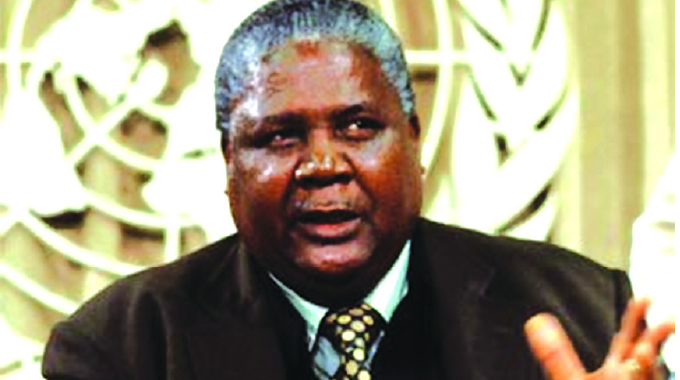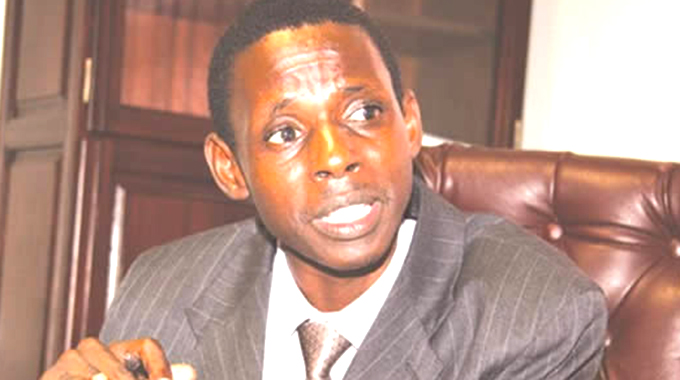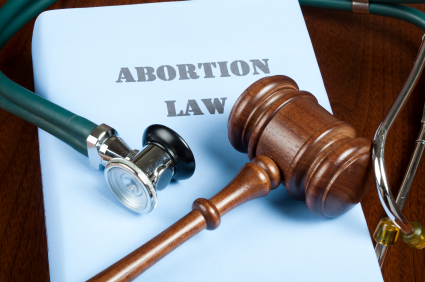Nkomo inspired healing, reconciliation

Mashudu Netsianda-Senior Reporter
ONE of the pioneers of the Second Chimurenga/Umvukela, Cde Moffat Hadebe, says among the late Vice-President Joshua Mqabuko Nkomo’s enduring legacy was his desire for national healing and reconciliation, which every Zimbabwean must cherish.
At 86, Cde Hadebe still remembers how the late national hero inspired him and many other youths at that time, to join the protracted liberation struggle that ushered Zimbabwe’s independence in 1980.
Popularly known as Father Zimbabwe, the fearless freedom fighter succumbed to prostate cancer on July 1, 1999 at the age of 82, and was buried at the National Heroes Acre in Harare.
In an interview as part of commemorating 23 years since the death of the veteran nationalist and liberation struggle stalwart, Cde Hadebe said Dr Nkomo played an inspirational role, which led to him join the armed struggle in 1964.
“In 1964 when the Rhodesian government had begun detaining people, the Zapu leadership under the stewardship of Dr Joshua Mqabuko Nkomo mobilised young people like us to join the liberation struggle.
“When the Rhodesian government adopted the Unilateral Declaration of Independence in November 1965, people were detained in numbers and Dr Nkomo directed James Chikerema, George Silundika, George Nyandoro and JZ Moyo to go into exile in Zambia as front-runners.
“When I fled the country together with other freedom fighters, we knew that the leadership had already been deployed there by Dr Nkomo. Before he was detained, Dr Nkomo had also made a prior arrangement with Russians to assist us with firearms,” said Cde Hadebe, regarded as the first cadre to fire the gunshot that marked the beginning of the armed struggle.
He described Dr Nkomo as a distinguished unifier and fatherly figure who had an enduring charisma and was a major source of inspiration for the country’s struggle and reconciliation after Uhuru.“Dr Nkomo’s vision was to see a united Zimbabwe and he never saw through the tribal lenses. In my own opinion, people in Mashonaland actually loved Dr Nkomo more than us in Matabeleland, which is why they named him Chibwechitedza,” he said.
Cde Hadebe said Father Zimbabwe’s vision for unity, land equity, socio-economic and political rights shaped the country’s nationalistic politics.“Dr Nkomo was Zimbabwe’s foremost nationalist figure who played a critical role in bringing about not only the country’s independence, but national healing and reconciliation among Zimbabweans after Gukurahundi. His legacy of unity, national healing and reconciliation is still enduring.”
The unity legacy had to be largely expressed through the signing of the historic Unity Accord on 22 December 1987, which brought to an end the civil unrest that ensued in the early 1980s.Cde Hadebe said during the struggle they used to call Dr Nkomo ‘General Josh’ because he was their commander in chief. He said the veteran nationalist championed a number of military trainings for freedom fighters in Russia, Zambia, Cuba and Angola among other countries. Cde Hadebe said through Dr Nkomo’s advice, they underwent military training and secured weaponry from key allies. The first weapons were smuggled out of Egypt in 1962 by Dr Nkomo and smuggled into the country through Tanzania and Zambia.
At the same time, the first handful of volunteers left the country for training in sabotage in Ghana, he recalled.
The first armed attack was actually carried out by a small Zapu “Special Affairs” unit under the command of Cde Moffat Hadebe on September 22, 1964 at Zidube Ranch in Matobo District, Matabeleland South Province. Zidube Ranch belonged to then Bulawayo senior magistrate, Mr Francis Fairwell Roberts who was part of the judiciary that oppressed black people by issuing out detention orders to the nationalists without any justification.
This was an armed attack on the homestead of a magistrate who had issued and signed the detention orders against many of the nationalist leaders. The unit was one of first trained units that had been deployed into the country by Zapu to carry out reconnaissance and preparations for armed struggle.
The attack, which Cde Hadebe executed together with Cdes Elliot Ngwabi, Keyi Nkala, Israel Maduma, Roger Matshimini Ncube and Rhodes Malaba, who was all late, was their first target in the country upon their deployment to Rhodesia. Cde Hadebe, together with three other combatants, Cdes Ngwabi, Nkala and Clark Ngiyo Mpofu, dramatically escaped from tightly guarded Grey Street Prison (now Bulawayo Prison) — in January 1965.The quartet had been detained at Gwanda Prison before being transferred to Grey Street Prison. Cdes Hadebe and Ngwabi’s offence was in connection with the Zidube Ranch attack while Cde Mpofu had been arrested over an explosive attack on Wilkie’s Circus, Tredgold Building and the Post Office. The attacks were carried out between August and September in 1964. They were detained for fighting injustice and oppression against blacks by the Rhodesian government. Cde Hadebe did his further military training in Algeria and deployed into then Rhodesia, leading the Pyramid Detachment in the Sipolilo (Guruve) Campaign in 1968. The detachment comprised Zapu and ANC cadres.
In the previous year Zapu and ANC had also engaged the Rhodesian and South African forces in the Wankie (Hwange) Campaign. Cde Hadebe said when Dr Nkomo was released from detention in Gonakudzingwa in 1975, he did not get an opportunity to interact with him since he had been arrested and detained at Khami Prison following his capture by the Portuguese soldiers in Mozambique where he had retreated to. The capture followed a series of battles during the Sipolilo Campaign.
The late Vice President was born on June 19, 1917 at Semokwe in Kezi District, Matabeleland South. His father, Mr Thomas Nyongolo Letswansto Nkomo was a teacher and lay preacher who was trained and worked for the London Missionary Society. After primary schooling in Rhodesia, he went to South Africa to complete his education in Natal and Johannesburg. Returning home in 1945, he worked for the Rhodesia Railways and by 1951 had become a leader in the trade union of the black Rhodesian railway workers. In 1951 he obtained an external BA degree from the University of South Africa, Johannesburg. Dr Nkomo became increasingly political, and in 1957 he was elected president of the African National Congress (ANC), the leading black nationalist organisation in Rhodesia.
Since then, he continued playing political leadership role until independence and into the free Zimbabwe








Comments